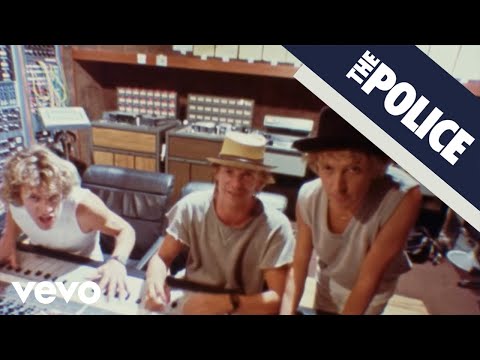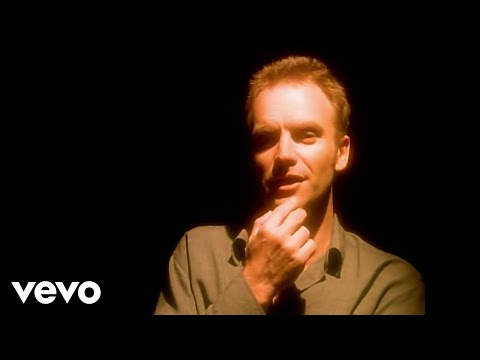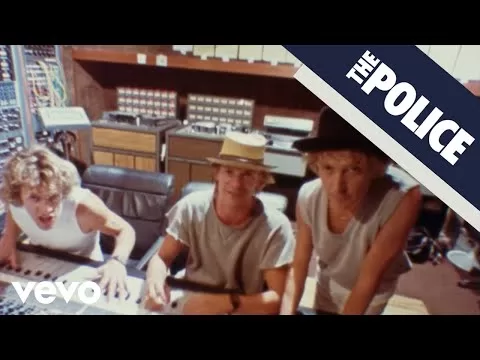Sting sits in a trailer at September’s Ohana Festival in Dana Point with two important questions before him: which songs to perform during that night’s headlining set and which pair of underwear to do it in.
“I’m not sure what color to wear,” he says, nodding toward a rainbow of Calvin Klein boxer-briefs arrayed on a countertop. Dressed in tight black jeans and a form-fitting white T-shirt, the 73-year-old musician holds a set list he figures he’ll keep fiddling with until right before he goes on. “We always front-load it with hits and end with hits,” he says. “But the middle is kind of fluid. Keeps it fresh.”
One reason that’s easy to do is because, after years in which Sting busied himself with orchestral concerts and a Broadway musical and a residency in Las Vegas, the singer and bassist is on the road with just two other musicians — guitarist Dominic Miller and drummer Chris Maas. Called Sting 3.0, the trio’s tour draws on Sting’s decades of songs as a solo artist and as the frontman of the Police, the wildly popular three-piece he formed in London in 1977 after a stint teaching English. This week the tour will circle back to Southern California for five shows at the Wiltern starting Tuesday night.
Sting — who with his wife, Trudie Styler, lives among homes in Europe, New York and Malibu — spoke before his Ohana performance about the new combo, his first trip to L.A. and whether he’d ever consider cosmetic surgery. These are excerpts from our conversation.
When you left the Police —
I never left the Police.
OK?
I didn’t.
When you stepped away from the Police —
I didn’t step away from the Police.
Took a pause from the Police? What would you call it?
I’m not sure what I did. I just made a record — as the others had done — and enjoyed it more than I did being in a band.
One of the ways you framed that shift at the time was that you wanted to broaden your music beyond the limits of a three-piece band.
And here I am again.
Explain that.
My whole modus is surprise. I don’t want people to be entirely confident about what I’m going to do next. That’s the essence of music for me. And no one expected a trio at this point.
As opposed to 15 years ago, right after the Police reunion tour.
That would have been stupid. And I’m far from stupid [laughs].
What do you like about the trio format?
I’ve enjoyed stripping the songs back down to the bare bones and enjoyed that they’re still sturdy enough to withstand that kind of stripping away. It makes them tougher and also clearer. There’s air between the instruments that allows the ear to relax a little bit. But you can turn on a dime.
What’s a Sting song that wouldn’t work this way?
It all works, surprisingly. You’d think something like “Every Little Thing She Does Is Magic” wouldn’t work with a three-piece.
That’s a Police song. Of course it works. I’m thinking of something more elaborate from one of your solo records — “I Hung My Head,” let’s say.
It’s a guitar riff with a counterpoint bass line. That’s easy.
You did a residency at Caesars Palace a few years ago, and I wondered whether that setting allowed you to get under the hood of your songs as you like doing.
I’d never done a Vegas residency before, so I thought I’d just have to do the hits, ring-a-ding. Actually, the audiences that turned out were pretty sophisticated. I talked to them more than I would in a normal gig, gave some context to a lot of the songs — where they were written, why they were written, what they were about. And that allowed me to pick some songs that might be a little bit esoteric, because I could explain them. I could invite the audience into my issues.
Is there a danger to staying in Vegas too long as a performer? Seems like it might dull your knife.
Doing a Vegas residency nowadays is not the same as it was for Tom Jones and Engelbert Humperdinck. They were sentenced for months and months and months. We did four shows a week for two weeks, then a couple of months off, then the same again. It was chewable bites. Nothing too onerous.

Have you been to the Sphere?
I saw U2 there early on. I loved the show but I thought it was difficult for the band to really appear out of all of that. It was so much to see. I don’t want to be overpowered by visuals, so I’m not sure it’s the place for me.
Do you remember your earliest visits to L.A.?
I do. We were in the Midwest, and we drove from across the country — through Omaha and across the Grand Canyon. We got to L.A. late one night in the van. We were on Sunset on the way to the Sunset Marquis, and I said, “Stop the van.” Whoever was driving said, “Why do you want to stop the van?” I said, “There’s a palm tree — I want to hug that palm tree.”
And?
I hugged the palm tree. The other guys thought I was nuts. But I was a hick from the north of England. I’d never seen a f—ing palm tree.
The internet tells me the first Police gig in L.A. was March 1, 1979.
We played the Whisky a Go Go, then we drove past A&M Records on La Brea, and there was a huge billboard with our faces on it. We met Jerry Moss and Herb Alpert and sat around the pool with all kinds of stars. I thought, “Wow, this is amazing.”
By the end of that year, you were at the Palladium.
We played everywhere from Madame Wong’s Chinese restaurant to the Greek Theatre to the Forum to the Hollywood Bowl to the Wiltern, which we’re going back to with this project.
Why five nights in a theater instead of one or two in an arena?
I think this format suits the theater more than anything else. The intimacy, the sense that the audience is part of the conundrum — you can’t do that in a larger place. A larger venue is about making large gestures: You wave your arm, the audience waves its arm. The theater is more refined.
Between these theater dates, you’re playing stadiums with Billy Joel.
Billy and I have been friends for a long time — since 1980. He came to see us at Nassau Coliseum — came on his own, walked into the dressing room, said: “Hi, I’m Billy Joel. I’m a big fan.” Then I spent an evening with him around a piano, and Billy started to play Gilbert and Sullivan, Beethoven, the Beatles. He can play anything. He’s a real mensch. I’ve always, always loved him. He asked me, “Would you come and open for my big tour?” I said, “Well, I don’t actually do that kind of thing. But I’ll do it with two provisos: One, you have to introduce me. And two, you have to sing a song with me.” So we open the set with him singing with me — we do “Every Little Thing She Does Is Magic.” Then I come on with him and we do “Big Man on Mulberry Street,” which is very jazzy. He has some shtick saying that he wrote it with me in mind. I don’t know if that’s true. But it’s a good story, so let’s not get in the way of that.
In 2014, you toured with Paul Simon. What’d you learn from that experience?
Paul is one of my teachers — one of my mentors. If I had an ambition to be a literate songwriter, he’d be the man whose feet I would sit at. Songs like “America” are masterpieces. It’s a pretty big subject, looking for America [laughs]. In less sure hands, that would’ve been a disaster. But he starts with pies and magazines and cigarettes, and then suddenly the epic nature of the song is revealed — that’s genius.
I caught that tour at the Forum. The two of you did your “Brand New Day” and his “The Boxer.”
For him to sing any of my songs was a great privilege. We’re quite similar in many ways. He’s more meticulous than I am, but I recognize his desire for perfection. I loved his new album: “Seven Psalms.”
I might be too dumb for that record. I didn’t get it.
Maybe you’re not old enough. It’s an album about death.
If you say so.
Next year.
Pink and Marshmello teamed up last year to remake your song “Fields of Gold” — the latest in a long line of covers or samples of your work. Why do you think your music keeps drawing younger musicians?
I have no idea, but when somebody wants to interpolate or whatever it’s called, I never object because I always learn something about the song that I hadn’t known or anticipated. And I get paid, so why not? It keeps them current. Songs are living organisms — you have to keep breathing life into them or giving them new bedfellows.

Probably fair to say that a good number of Marshmello fans —
Don’t know it’s me. That’s OK. But if they do some archaeological research, they find me there.
Sean “Diddy” Combs famously sampled “Every Breath You Take” for his “I’ll Be Missing You.” Do the recent allegations against him taint the way you think about “Every Breath You Take”?
No. I mean, I don’t know what went on [with Diddy]. But it doesn’t taint the song at all for me. It’s still my song.
And people still love to hear it.
Absolutely.
What’s your fitness regimen these days?
I swim every morning when I can. I studied yoga for 35 years, so everything is related to that. I stretch, I work out, I walk. I’m physically very fit, and that keeps me mentally fit.
How much of it’s wellness and how much of it’s vanity?
Fifty percent vanity — maybe 55 — and 45% discipline. I’m doing the job of a 25-year-old.
Say more about the vanity. You see a picture of yourself onstage and —
I don’t look at pictures of myself. But you need enough professional vanity to go onstage in the first place. I wouldn’t want to go on if I was overweight or wearing spandex. If that happens to me, I’m not going onstage. So the vanity is somewhat essential, and it’s not particularly harmful. I’m not spending hours of the day looking in the mirror or getting made up or going to the hairdresser’s every day or wearing a wig or a corset.
You ever feel pressured to get a little work done? Some lifting or tightening?
Look at me — I’m f—ing perfect. What’s the matter with you?
Is your wife the one entrusted to tell you if things start getting soft?
Oh, she’s constantly looking for a younger man [laughs]. And she looks hot.
What’s your attitude toward drink and drugs at this stage of your life?
I like a glass or two of wine at the end of the show, or a glass of mezcal. I’d never say I’m giving up drinking. I’ve never smoked anything legal in my life, which I’m happy to say.
Anything legal?
I never smoked tobacco. I smoked marijuana, but it’s not so interesting to me anymore.
It’s kind of amazing that you weren’t smoking cigarettes as a rock star in the ’80s.
I was an athlete as a young person, and smoking was not what you did. I don’t think it’s healthy. My father smoked for as long as he lived, and I always knew there was something wrong with it, even before the research was there. I would throw his cigarettes in the fire, which made me very popular around the house.
Did you feel at home in the rock milieu of the ’80s?
Not really. I was a schoolteacher. I always prided myself on being singular — not really being part of a milieu. And that milieu kind of died out.
